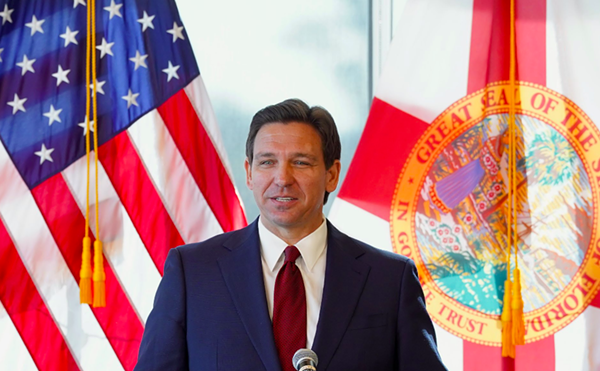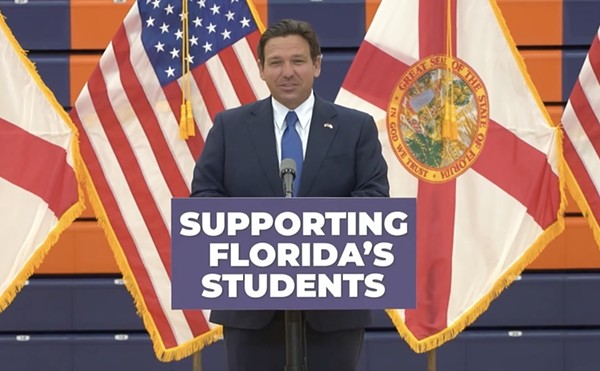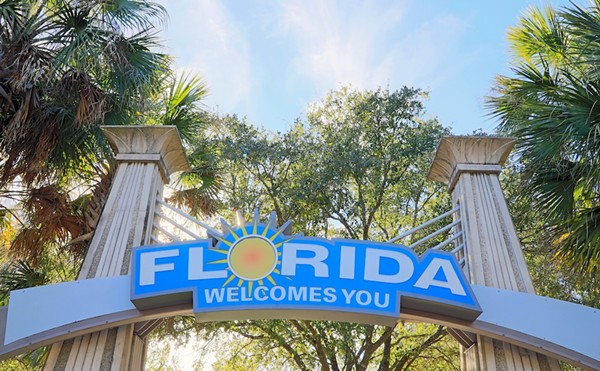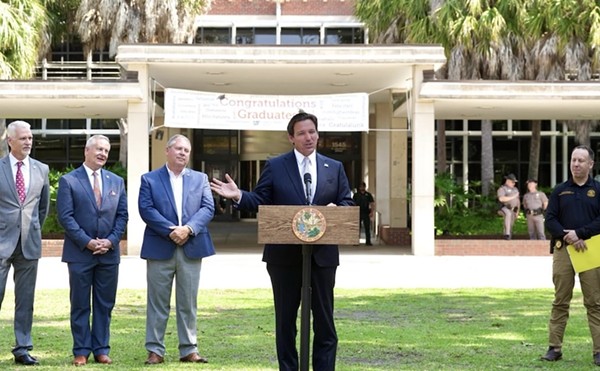A few days before the 2000 Election, before the terms "butterfly ballot," "hanging chad" and "Katherine Harris" would send chills up Democratic spines, a University of Florida grad student was surprised by how easily his telephone call was patched through to Florida's soon-to-be famous Secretary of State.
Marc John Randazza was working on his master's thesis in mass communications, exploring legal questions raised by interstate "vote-trading," a provocative electoral strategy that was almost unthinkable before the broad proliferation of Internet usage. Randazza, now an attorney who lives in Orlando, wanted Katherine Harris' take on how Florida law might regard the idea promoted by websites like Voteswap2000 and NaderTrader.org to break the dilemma expressed in the mantra "a vote for Nader is a vote for Bush." These sites sought to tilt the Electoral College against George W. Bush by encouraging alliances between Ralph Nader supporters in battlegrounds like Florida and frustrated Democrats in partisan strongholds like Texas. A Green Floridian might tell the Texan Dem: If you cast my vote for Nader, then I'll cast your vote for Gore – and we'll both sleep better. Randazza wanted Harris' opinion on whether the scheme was legal or not.
"Absolutely illegal," Harris declared, according to Randazza's account in a law review article titled "The Other Election Controversy of Y2K: Core First Amendment Values and High-Tech Political Coalitions." To Randazza, Harris sounded every bit as certain as her Republican counterpart in California, who a few days earlier had outraged civil libertarians by threatening web activists with imprisonment, prompting them to shut down their sites. Randazza says that when he pressed Harris to cite a relevant statute, she simply stated the practice is illegal because "a vote is to be voted, not traded or swapped."
SPOILING FOR A FIGHT
In 2004, vote trading is back. Attacked by Republican pols, shunned by Nader and Gore, relegated to footnote status by the Florida fiasco, the insurgent strategy is now being promoted by web sites such as VotePair.org and groups like Greens for Kerry as a pragmatic means to defeat Bush, elect John Kerry and strike a blow for alternative political parties and viewpoints.
Vote-trading advocates say the strategy, which in another election could be used by conservatives against a liberal, enhances the Electoral College's ability of delivering a result that doesn't distort democracy. The Electoral College has always had a strange math department, beginning with its historic roots in the notorious 18th-century compromise that counted slaves as three-fifths of a human being to determine a state's proportional representation in the House of Representatives and Electoral College. More than two centuries later, this arcane institution determined that the ballots of 537 Floridians for Bush were more important than those of the more than 550,000 Americans who preferred Gore. Vote-trading activists says that if enough Americans participate – the VotePair.org site says 50,000 might be enough – Bush might win the popular vote and lose the presidency.
"This is about people coming together, forming a coalition," says Randazza, an associate in the Altamonte Springs law firm Weston, Garrou & DeWitt, who volunteers his services for VotePair. (His paying job is defending the First Amendment rights of adult-entertainment businesses.) "As a constitutional battle, I think it's very important."
Controversy is certain. After VotePair.org's site launched on Sept. 20, a spokesman for the Republican National Committee, Yier Shi, was quoted in news accounts calling it "an online scheme" and declaring, "Brokering to exchange a vote, I think, runs contrary to the spirit of fair elections."
Randazza, a member of the Florida Bar's Media and Communications Law Committee, sounds almost regretful that Harris has moved on to Congress. But because Florida's Division of Election remains under Republican leadership, "I would expect a hostile response," says Randazza. He is spoiling for a fight.
THE SWAMP OF 2000
Four years ago, Randazza's search for a definitive legal position in Florida also slipped into a murky swamp. Harris' certitude, he says, contrasted with the comments he heard from Sharon Larson, Assistant General Counsel to the Secretary of State's Division of Elections, who said vote pairing "could possibly be a violation of the law." He later received e-mail from election officials citing codes pertaining to agreeing to vote a certain way "in return for a pecuniary or other benefit."
This is similar to the rationale California Secretary of State Bill Jones used in his controversial crackdown, which cited a law that prohibits the exchange of a vote for "a consideration of value." Randazza wrote: "As one of the top prizes in the Electoral College, vote-pairing demands analysis under Florida law. This is especially true in light of the fact that the Secretary of State's General Counsel's office is so unsure as to whether the practice is illegal."
Jurisdiction appears to rest with the states, but will John Ashcroft's Department of Justice remain on the sidelines like Janet Reno's DOJ did in 2000? California's Jones is out of office and running for Senate, but Minnesota Secretary of State Mary Kiffmeyer, also Republican, bears watching. Randazza found Kiffmeyer's critique in 2000 especially shrill and partisan. Vote trading, she declared, is "an underhanded scheme that induces voters to cast their vote for a candidate they would not normally support."
Randazza conducted the most thorough examination of how state election officials in 2000 addressed vote-trading sites. His conclusion: "Ultimately, what controls this issue is that vote-pairing is protected by the federal Constitution. Voting to achieve a political goal is the essence of democracy. The vote-pairing websites took the consensus-building aspect of the political meeting and political speech from the town hall and transferred it into cyberspace. That the political meeting and discussion took place in the digital world, as opposed to a meeting room, does not change the level of constitutional protection that should be afforded."
As for Randazza's own politics, consider footnote No. 577 of his article as it appeared in the Washington University Law Quarterly: "In the interest of full disclosure, the author will reveal his political biases. The author's parents are two of five registered Republicans in their voting district in Massachusetts. The author's father refers to the author as 'that goddamned liberal.' Despite this fact, the author is a registered Republican and served as a volunteer for the 2000 McCain presidential campaign. The author supported Bill Weld (R), Paul Celucci (R), and Mitt Romney (R) for Governor of Massachusetts. The author wrote himself in for President in 1992 and 1996 in unsuccessful bids for the White House. Therefore, the author considers himself to have been unbiased as far as a preference for or against either major party in the 2000 presidential election. He was equally disgusted by both."
NOTHING NEW
Anecdotal accounts of vote trading in presidential elections – or, as the activists now prefer to phrase it, "vote pairing" – goes back for generations, but only on a small scale among family and friends. The Internet took the idea to the masses, introducing like-minded strangers. During the 2000 campaign, at least two obscure, modest sites were up, and two sophisticated ones were in the works when, on Oct. 29, the online magazine Slate published a vote-trading manifesto by American University law professor Jamin Raskin. His article energized the movement, driving web traffic and inspiring the creation of new sites, which soon were linked together. Raskin was quick to accuse California's Jones of partisan persecution after his threats succeeded in shutting down two vote-trading websites.
Election officials in four other states followed Jones, claiming the sites were unlawful; the only Democrat in the group reversed himself after further study. The crackdown, activists say, had a chilling effect, unjustly casting an ethical pall on the movement. A Florida-based site called PresidentGore.com, for example, was programmed to keep persons who registered a California address from participating. An ACLU suit against Jones concerning his 2000 actions has not been resolved, but it is largely considered academic.
Overlooked in the controversy was the fact that Jones' office, splitting a fine legal hair, quietly judged that sites that "promote communication" among citizens considering the strategy are lawful, unlike those that that "broker votes" among citizens determined to pair up. Another head-scratcher is how a Jones spokesman could keep from laughing when he explained that California law is so strict that spouses who pair votes – "Honey, I'll vote for Bill Jones for Senate if you vote for President Bush!" – are outlaws conspiring to commit election fraud.
Carnet Williams, a Nature Conservancy project director in Hawaii, coordinates 20 volunteers across the country who are collaborating on VotePair.org. The group, he says, is applying lessons learned in 2000. One is to be ready for battle. With the ACLU and the National Voting Rights Institute on its side, as well as attorneys Raskin and Randazza, the movement won't be intimidated by authoritarian attacks, Williams says. If authorities in one state move to shut down a web server, the operation can be shifted to servers in other sites.
Another lesson: Image matters. To some, vivid phrases like "vote trading" or the sexier "vote swapping" carry connotations of an unseemly quid pro quo and raise ethical, if not legal, questions. "Vote swapping lends itself to a negative sound bite very easily," Randazza explains. "It sounds like wife swapping or file swapping." Some news reports in 2000 even likened the sites to Napster for voters, and made references to an earlier hoax involving votes auctioned on eBay.
Advocates point out that pledges are exchanged, not votes, and the secrecy of the ballot assures that alliances are based on trust.
Swingin' Florida is a prime target. Not only is it large, but its ballot includes Nader, Green Party candidate David Cobb and Libertarian Michael Badnarik. Each alternative candidate, VotePair political analyst Amy Morris says, has supporters who may pragmatically opt for Kerry against Bush, once they are confident an ally in, say, Utah would vote for their first choice. (Texas may have more frustrated Democrats than any other state, but neither Nader nor Cobb qualified for its ballot, making a Sunshine/Lone Star alliance trickier.)
The 2000 experience shows how the Electoral College gives vote pairing a special appeal. Despite a late start and attempts to suppress the movement, a post-election survey of a dozen vote-trading websites showed that 36,000 prospective traders had registered and more than 15,000 pairs were forged. Vote pairing may well have delivered Gore's razor-thin, 365-vote victory in New Mexico. More than 1,400 Floridians registered to trade votes, while more than 96,000 cast ballots for Nader.
It's hard to say whether vote pairing will gain traction in 2004, given the perception of a stark choice between Bush and Kerry. Vote-pair advocates are encouraged, however, by a new attitude within the Green Party, which heatedly scorned the strategy in 2000. Groups like Greens for Kerry and Greens for Impact have embraced a "safe states" strategy that dovetails neatly with vote pairing. "Encourage your friends to participate in vote pairing!" urged a recent Greens for Kerry e-mail. And while Nader denounced vote trading in 2000, Green Party nominee David Cobb has a more tempered view, saying he disagrees with the vote-pairing strategy but respects the effort. Cobb sees Kerry as preferable to the president. Bush, he says, "is a genuine threat to the planet."
In 2000, the web-roots movement proliferated without the endorsement of any organized interest group – no Green offshoots, no Sierra Club, no Rock the Vote, no unions or gay rights group. Beyond the websites, the activism in 2000 tended to be personal. NaderTrader.org founder Jeff Cardille, the movement's unofficial historian, learned about some Green-leaning congregants in a Unitarian Universalist church in Pennsylvania who partnered with a UU group in New York. And there were some retired college professors in Wyoming who recruited friends to team up with "nervous Naderites" in Wisconsin. An open question is how well the sites may live up to VotePair.org's mission of "uniting progressives through strategic voting."
Peter Burkard, who lives 50 miles south of Tampa, was a strong Nader supporter in 2000 who was "unimpressed" by the vote-trading strategy. But "the horrors" of the Bush Administration have forced him to take another look. "I'm willing to embrace any legal strategy. Visiting the `VotePair` website helped clear up some concerns about ethics and trust."
Sam Wade Sears is a Manatee County resident who says he recently switched his registration from Democrat to Green. "Many of the Nader voters will vote for Kerry this time around," predicts Sears, who is active in Greens for Kerry. "I will continue to try to get both parties to engage in common ground seeking and acting together at every opportunity.
"I believe we will take Florida's electoral votes this time around," Sears said via e-mail. "We did it before. Got cheated. But we can do it again in spite of the cheating of the Bush Cabal."


















